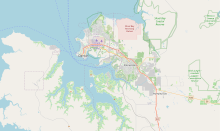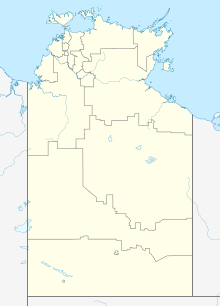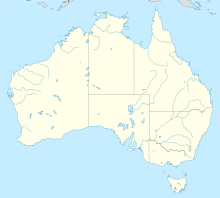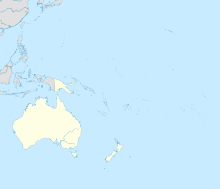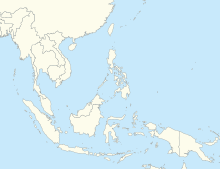Darwin International Airport (IATA: DRW, ICAO: YPDN) is a domestic and international airport, and the only airport serving Darwin, Australia. It is the eleventh busiest airport in Australia measured by passenger movements.
Darwin International Airport | |||||||||||||||
|---|---|---|---|---|---|---|---|---|---|---|---|---|---|---|---|
 | |||||||||||||||
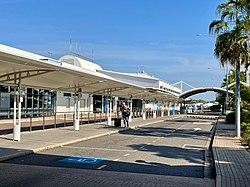 | |||||||||||||||
| Summary | |||||||||||||||
| Airport type | Public / military | ||||||||||||||
| Owner | Royal Australian Air Force (RAAF) | ||||||||||||||
| Operator | Darwin International Airport Pty Ltd (DIA) | ||||||||||||||
| Serves | Darwin | ||||||||||||||
| Location | Eaton, Northern Territory, Australia | ||||||||||||||
| Hub for | Airnorth | ||||||||||||||
| Focus city for | Qantas | ||||||||||||||
| Elevation AMSL | 103 ft / 31 m | ||||||||||||||
| Coordinates | 12°24′53″S 130°52′36″E / 12.41472°S 130.87667°E | ||||||||||||||
| Website | www | ||||||||||||||
| Maps | |||||||||||||||
 | |||||||||||||||
 | |||||||||||||||
| Runways | |||||||||||||||
| |||||||||||||||
| Statistics (2012) | |||||||||||||||
| |||||||||||||||
Sources: Australian AIP and aerodrome chart[1] passenger and aircraftmovements from the Department of Infrastructure and Transport[2] Darwin International Airport Pty Ltd (DIA) is 100% owned by Airport Development Group of Northern Territory Airports.[3] | |||||||||||||||
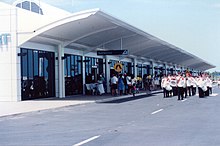
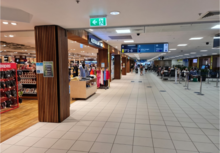
The airport is located in Darwin's northern suburbs, 8 km (5.0 mi) from Darwin city centre, in the suburb of Eaton. It shares runways with the Royal Australian Air Force's RAAF Base Darwin.
Darwin Airport has an international terminal, a domestic terminal and a cargo terminal. Both of the passenger terminals have a number of shops and cafeterias.
History
editEarly years
editIn 1919, when the England to Australia air race was announced, Parap Airfield was established in the suburb of Parap to act as the Australian terminal.[4] It operated as two airports, a civilian airport and a military field.
The airfield frequently took hits from Japanese bombing through the Second World War, and was used by the Allies to project air power into the Pacific. The airport hosted Spitfires, Hudson Bombers, Kittyhawks, C-47s, B-24 Liberators, B-17 Fortresses and PBY Catalinas.[5]
In 1945 the Department of Aviation made the existing Darwin military airfield available for civil aviation purposes. As a result, the civilian airport at Parap was closed down and airport operations combined with the military airport.[4]
On 20 April 1954, Soviet spy Evdokia Petrova defected at Darwin Airport while she was being escorted out of Australia by KGB agents.
Between 1950 and 1974 Darwin Airport acted as the primary domestic and international airport for the Northern Territory and an important stop for airlines flying between Australia and Asia and onwards to Europe. UTA,[6] BOAC,[7] Alitalia[8] and Air India[9] were some airlines that had scheduled services to Darwin. However the introduction of longer range aircraft in the 1970s meant that many airlines did not need to stop over in Darwin, and chose to cease services.
Cyclone Tracy hit Darwin in 1974 and flattened the city. The airport was used to ferry 25,628 people out of Darwin.[10] Darwin Airport was extensively used to assist UN operations in East Timor from 1999, and to support medical evacuations following the 2002 Bali bombings.
The new passenger terminal, with four aerobridges, was opened in December 1991.
21st century
editExpansion of the low-cost carrier business model in the Australian market during 2007–08 saw both Jetstar and Tiger Airways Australia express interest in developing Darwin Airport as a hub.[11] With Darwin's proximity to Southeast Asia, Jetstar anticipated that it would be able to make flights using smaller aircraft, such as the Airbus A320 to fly anywhere within 4 to 5 hours from Darwin.[12] Singapore-based Tiger maintained a route between Changi Airport and Darwin until 2008, with its Australian subsidiary operating domestically to Melbourne (and later Brisbane). However, plans for a Darwin hub failed to eventuate. Jetstar established a Darwin base, with flights to Singapore, Bali, and Tokyo via Manila but most of these routes would be withdrawn by May 2013.[13]
In 2008 the Australian Infrastructure Fund (AIX), which holds 28.2% of Northern Territory Airports, announced that the airport would undergo a $60 million expansion to cater for growing passenger numbers. Among other improvements it would provide a 65 per cent increase in terminal floor space.[14]
During the 2008–09 financial year,[15] a total of 1,538,938 passengers passed through Darwin International Airport which consisted of 188,530 international passengers and 1,350,408 domestic passengers.[16]
In April 2009, Garuda Indonesia suspended the Denpasar service from Darwin after nearly 30 years of service, citing "economic reasons". The move drew protests from the Northern Territory government.[17][18] The suspension left Darwin Airport without any non-Australian carriers flying there until late 2010 when Indonesia AirAsia started services from Bali to Darwin. Despite this, the number of passengers passing through the airport grew by 2% to 1,569,007 (207,825 international) passengers during the 2009–10 financial year.[16]
In December 2010 the Federal Government approved the Darwin Airport Master Plan, a 20-year blueprint guiding the airport's development as an international transit point between Europe, Asia and Australia.[19] 2012 and 2013 saw a major boost for Darwin Airport when foreign carriers SilkAir, Indonesia AirAsia, Philippine Airlines and Malaysia Airlines started direct flights to Singapore, Bali, Manila and Kuala Lumpur respectively. However, the increased competition from these carriers forced Jetstar to abandon its base in Darwin and redeploy its aircraft elsewhere.[20][21][22][23] Only flights to Bali were retained with the Singapore route taken over by Jetstar Asia with Singapore-based aircraft and crews.
On 9 May 2015, a major expansion of the terminal was officially opened. The $85 million expansion increased the floor area from 16,000 to 27,000 square metres (172,223 to 290,626 sq ft) to double the capacity of the airport at peak periods. Works enlarged the arrivals and departures areas, added four new domestic and two new international boarding gates, additional security screening areas, a larger check-in area and a new multi-use baggage reclaim area for both domestic and international arrivals. New Qantas and Virgin Australia lounges opened with the expansion as well as additional Duty Free and retail options.[24]
COVID-19 pandemic
editDuring March 2020, Qantas operated non-stop flights between Darwin and London Heathrow.[citation needed] Normally routing from London to Sydney via Singapore on an Airbus A380, flights QF1 and QF2 instead made a technical stop in Darwin due to air travel restrictions imposed in response to the COVID-19 pandemic. The Northern Territory's own border restrictions forced passengers to remain on-board during refuelling in Darwin, before an onward journey to either London or Sydney.
In October 2021, Qantas confirmed that it would operate its flagship direct route from Australia to London via Darwin, with the Northern Territory city in place of their Perth hub until June 2022.[25]
Facilities
editDarwin Airport offers scheduled flights to regional destinations in the Northern Territory, domestically throughout Australia and in Southeast Asia. Domestic and international services operate from a single terminal.[26] Civilian operations are concentrated on the northern side of the airfield, where the main terminal building is located. Regional airline Airnorth has its head office and maintenance facilities on the airport property[27] and Bristow Helicopters also maintain a base of operations to supporting the resources industry. There are two general aviation aprons north of the main terminal building.
The area south of runway 11/29 and adjacent to the Stuart Highway is occupied by RAAF Base Darwin and Darwin Aviation Museum. It is used predominately for military operations.
Darwin airport electricity needs are partially met by two photovoltaic solar arrays. Stage 1 covers six hectares near the eastern end of the main runway, generates up to 4.0MW of electricity, and opened on 5 August 2016. At the time of construction it was described as the largest airside photovoltaic system in the world.[28] Stage 2 provides a further 1.5 MW, and opened in December 2016 near the general aviation apron on the western side of the airport.[29]
Airlines and destinations
editPassenger
edit| Airlines | Destinations |
|---|---|
| Airnorth | Alice Springs,[30] Broome, Cairns, Dili, Elcho Island, Gove, Groote Eylandt, Katherine, Kununurra, Maningrida, McArthur River Mine, Milingimbi, Tennant Creek, The Granites, Townsville Seasonal: Perth[31] |
| Alliance Airlines | Charter: Alice Springs, The Granites[32] |
| Arafura Aviation | Charter: Bathurst Island, Maningrida, Milikapiti[33] |
| Fly Tiwi | Gapuwiyak, Milikapiti, Minjilang, Nguiu, Pirlangimpi, Ramingining, Tennant Creek, Warruwi |
| Jetstar | Adelaide, Brisbane, Denpasar, Melbourne, Sydney |
| Nexus Airlines | Broome, Kununurra[34] |
| Qantas | Brisbane, Melbourne (ends 27 January 2025),[35] Sydney |
| QantasLink | Adelaide, Alice Springs,[36] Brisbane, Cairns,[37] Dili,[38] Melbourne (begins 27 January 2025),[35] Perth, Singapore (begins 30 March 2025)[39] Seasonal: Canberra |
| Singapore Airlines | Singapore[40] |
| Virgin Australia | Adelaide, Brisbane, Melbourne, Perth |
| Virgin Australia Regional Airlines | Perth |
Cargo
edit| Airlines | Destinations |
|---|---|
| Qantas Freight[41] | Hong Kong |
| Toll Aviation[citation needed] | Cairns |
Operations
editTotal
editGraphs are unavailable due to technical issues. Updates on reimplementing the Graph extension, which will be known as the Chart extension, can be found on Phabricator and on MediaWiki.org. |
| Year | Total passengers |
International | Domestic | % change |
Total aircraft movements |
International | Domestic | % change |
|---|---|---|---|---|---|---|---|---|
| 2001–02 | 962,589 | 127,768 | 834,821 | −10.7% | 17,253 | 1,985 | 15,268 | −22.0% |
| 2002–03 | 985,172 | 89,306 | 895,866 | 2.3% | 17,243 | 1,311 | 15,932 | −0.1% |
| 2003–04 | 1,073,440 | 84,106 | 989,334 | 9.0% | 16,508 | 1,410 | 15,098 | −4.3% |
| 2004–05 | 1,210,734 | 103,215 | 1,107,519 | 12.8% | 16,501 | 1,987 | 14,514 | 0.0% |
| 2005–06 | 1,219,378 | 116,454 | 1,102,924 | 0.7% | 16,416 | 2,309 | 14,107 | −0.5% |
| 2006–07 | 1,403,685 | 134,217 | 1,269,468 | 15.1% | 17,981 | 2,951 | 15,030 | 9.5% |
| 2007–08 | 1,562,216 | 173,243 | 1,388,973 | 11.3% | 19,270 | 3,421 | 15,849 | 7.2% |
| 2008–09 | 1,538,938 | 188,530 | 1,350,408 | −1.5% | 22,733 | 5,225 | 17,508 | 18.0% |
| 2009–10 | 1,569,007 | 207,825 | 1,361,182 | 2.0% | 26,310 | 4,986 | 21,324 | 15.7% |
| 2010–11 | 1,679,934 | 252,214 | 1,427,720 | 4.9% | 27,237 | 5,153 | 22,084 | 3.5% |
| 2011–12 | 2,044,622 | 357,210 | 1,687,412 | 21.7% | 26,829 | 3,797 | 23,032 | −1.5% |
| 2012–13 | 1,925,039 | 313,032 | 1,612,007 | −5.8% | 26,259 | 3,545 | 22,714 | −2.1% |
Domestic
edit| Rank | Airport | Passengers carried | % change |
|---|---|---|---|
| 1 | Queensland, Brisbane | 376,602 | 7.3 |
| 2 | New South Wales, Sydney | 310,700 | 3.4 |
| 3 | Victoria, Melbourne | 307,293 | 0.3 |
| 4 | Western Australia, Perth | 194,308 | 2.0 |
| 5 | Northern Territory, Alice Springs | 109,707 | 7.6 |
International
edit| Rank | Airport | Passengers handled | % change |
|---|---|---|---|
| 1 | Singapore, Singapore-Changi | 79,864 | 46.8% |
| 2 | Indonesia, Denpasar | 77,199 | 4.5% |
| 3 | East Timor, Dili | 31,289 | 24.8% |
Accidents and incidents
edit- On 26 January 1960, a Transportes Aéreos de Timor (TAT) de Havilland Heron, registration CR-TAI, crashed north west of Bathurst Island in the Timor Sea, approximately one hour after taking off from Darwin on a flight to Baucau, Portuguese Timor. Two crew members and seven passengers were killed.[44] The passengers included Dr. Klaus Thorak, a prominent Northern Territory government veterinarian, his wife and their 15-year-old son.[45] It is believed that the pilot had difficulty with poor visibility, for which he had not been trained.[44]
- On 25 December 1974, Douglas C-47B PK-RDB of Seulawah Air Services was damaged beyond economic repair by Cyclone Tracy.[46]
- On 22 March 2010, an Embraer EMB 120 Brasilia operated by Airnorth crashed after takeoff during a training flight. A check and training pilot and pilot under instruction were the only occupants and were both killed in the accident. Shortly after becoming airborne from runway 29, the pilot-in-command closed the power lever to simulate a failure of the left engine. During the manoeuvre, control was lost. The aircraft rolled left, pitched nose down and impacted the ground close to the golf course at RAAF Base Darwin. The subsequent investigation conducted by the Australian Transport Safety Bureau found that the incorrect throttle setting used by the pilot-in-command resulted in a simulated failure of the propeller auto-feathering system that increased the aircraft's tendency to roll, and that the pilot under check increased power on right engine, further increasing the roll. The crew failed to abandon the manoeuvre once control was lost. As a result of the accident, Airnorth now conducts most flight proficiency training using a simulator.[47]
See also
editReferences
edit- ^ YPDN – Darwin (PDF). AIP En Route Supplement from Airservices Australia, effective 13 June 2024, Aeronautical Chart Archived 25 March 2012 at the Wayback Machine
- ^ "Airport traffic data". Archived from the original on 19 August 2014. Retrieved 13 June 2017.
- ^ "Welcome to Northern Territory Airports". Airport Development Group. Archived from the original on 7 April 2012. Retrieved 18 August 2014.
- ^ a b "History of the Qantas Hangar". Northern Territory Government. Natural Resources, Environment and The Arts. Archived from the original on 30 August 2008. Retrieved 16 June 2008.
- ^ "Darwin Airport – History of the Terminal". 28 January 2008. Archived from the original on 28 January 2008. Retrieved 13 June 2017.
- ^ "UTA timetable, 1964". Retrieved 30 May 2011.
- ^ "BOAC timetable, 1964". Retrieved 30 May 2011.
- ^ "Alitalia timetable, 1961". Retrieved 30 May 2011.
- ^ "Air India website". Home.airindia.in. Archived from the original on 29 December 2011. Retrieved 30 May 2011.
- ^ "Darwin International Airport - Airport Meet And Greet Services | Airport Assistance Services Worldwide - JODOGO". www.jodogoairportassist.com. Archived from the original on 20 August 2023. Retrieved 20 August 2023.
- ^ Creedy, Steve (22 December 2007). "Jetstar plan for Darwin springboard into Asia". The Australian. Archived from the original on 15 March 2008. Retrieved 25 June 2008.
- ^ Creedy, Steve (2 August 2008). "Jetstar boosts services from Darwin airport". The Australian. Retrieved 2 September 2008.
- ^ "Jetstar shuts Darwin base as competition grows – Travel Weekly". travelweekly.com.au. 9 December 2013. Retrieved 13 June 2017.
- ^ "AIX announces Darwin airport expansion". The Sydney Morning Herald. 11 July 2008. Retrieved 11 July 2008.
- ^ 1 July to 30 June
- ^ a b c "Airport Traffic Data 1985–86 to 2010–11". Bureau of Infrastructure, Transport and Regional Economics (BITRE). May 2012. Archived from the original on 24 March 2012. Retrieved 8 May 2012. Refers to "Regular Public Transport (RPT) operations only"
- ^ Bourchier, Daniel (17 April 2009). "Plea for Garuda to retain Darwin flights". Archived from the original on 25 August 2009. Retrieved 23 November 2009.
- ^ "Garuda pulls pin on Darwin after 30 years". Archived from the original on 15 March 2019. Retrieved 23 November 2009.
- ^ "Darwin airport master plan approved". 20 December 2010. Archived from the original on 7 March 2011. Retrieved 29 January 2011.
- ^ Creedy, Steve (12 July 2013). "Malaysia Airlines latest to resume Top End service". The Australian. Retrieved 15 July 2013.
- ^ "Jetstar shuts Darwin base as competition grows". 9 December 2013.
- ^ "AirAsia Indonesia resumes flights from Darwin to Bali". www.darwinairport.com.au. Archived from the original on 4 March 2016.
- ^ "Singapore Airlines offshoot Silk Air begins flights to Darwin – Executive Traveller". executivetraveller.com. 26 March 2012.
- ^ "Prime Minister Tony Abbott officially opens Darwin Airport's expanded terminal". Newsroom. Northern Territory Airports. 9 May 2015. Archived from the original on 18 May 2015. Retrieved 11 May 2015.
- ^ "Qantas to fly Kangaroo Route from London to Darwin". Archived from the original on 9 October 2021.
- ^ Pike, John (27 April 2005). "Space Shuttle Emergency Landing Sites". Globalsecurity.org. Retrieved 30 May 2011.
- ^ "Contact us Archived 8 February 2011 at the Wayback Machine." Airnorth. Retrieved 10 February 2011. "Administration 4 Lancaster Road MARRARA."
- ^ "Darwin Airport completes 4MW large scale solar array". Darwin International Airport. 5 August 2016. Archived from the original on 12 March 2019. Retrieved 16 September 2019.
- ^ "Annual Report 2016-17". Airport Development Group. p. 13. Archived from the original on 1 March 2020. Retrieved 16 September 2019.
- ^ "Airnorth launches "Centre Run" flights between Darwin and Alice Springs – Australian Aviation". australianaviation.com.au. 14 September 2015. Retrieved 13 June 2017.
- ^ "Airnorth". secure.airnorth.com.au.
- ^ "About Us". allianceairlines.com.au. Retrieved 13 June 2017.
- ^ "Backcharters". Arafura Aviation.com.au. Retrieved 10 December 2023.
- ^ "Flight Schedules".
- ^ a b Liu, Jim (28 October 2024). "Qantas Adds A220 Melbourne – Darwin Service in 1Q25". Aeroroutes. Retrieved 2 November 2024.
- ^ "QANTAS NORTHERN TERRITORY NETWORK CHANGES". Qantas News Room. 13 November 2018.
- ^ "QANTAS ADDS NEW ROUTES FROM DARWIN TO FAR NORTH QUEENSLAND". Qantas News Room. 14 October 2021.
- ^ Casey, David. "Qantas Launches New International Service From Darwin". Routesonline. Retrieved 31 March 2022.
- ^ "Qantas delays restart of Darwin-Singapore - Executive Traveller". 6 June 2024.
- ^ "Singapore Airlines NS25 Darwin Schedule Changes".
- ^ "NEW QANTAS FREIGHT SERVICE DIRECTLY LINKS DARWIN WITH HONG KONG". Qantas News Room. 25 July 2018.
- ^ "Australian Domestic Domestic aviation activity 2018". Bitre.gov.au. March 2019. Archived from the original on 2 April 2019. Retrieved 27 May 2019.
- ^ "International Airline Activity—Time Series". bitre.gov.au. 3 September 2024. Retrieved 7 September 2024.
- ^ a b Accident description for CR-TAI at the Aviation Safety Network. Retrieved on 13 February 2022.
- ^ "Thorak History: Dr Klaus Eberhard Thorak". Litchfield Council. Retrieved 16 February 2022.
- ^ "PK-RDB Hull-loss description". Aviation Safety Network. Retrieved 24 August 2010.
- ^ Australian Transport Safety Bureau "Loss of Control – Embraer S.A. EMB-120ER Brasilia VH-ANB", 23 February 2012
